본문


Prof. Cheol-Min Park and colleagues at ABML (Advanced Battery Materials Lab. in KIT) in Korea are attempting to meet the ever increasing demands for better batteries.
INTRODUCTION
About Lab
- Home>
- Introduction >
- About Lab
- 하단정보
- [730-701] T132, 61 Daehak-ro, Gumi, Gyeongbuk 730-701, Korea| TEL (054) 478-7761 | FAX (054) 478-7769
- COPYRIGHT (C) 2011 KUMOH NATIONAL INSTITUTE OF TECHNOLOGY. ADVANCED BATTERY MATERIALS LAB.
- ALL RIGHTS RESERVED.









